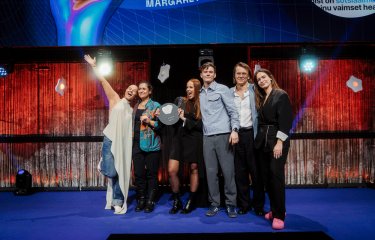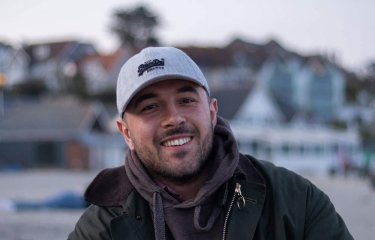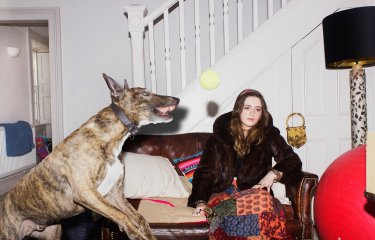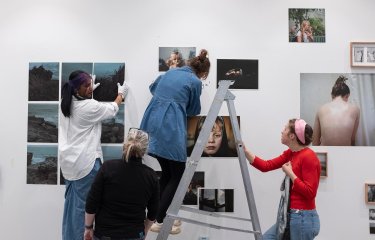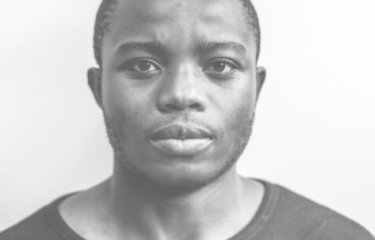Falmouth duo launch dynamic new publication BLEACH Magazine
27 July 2023
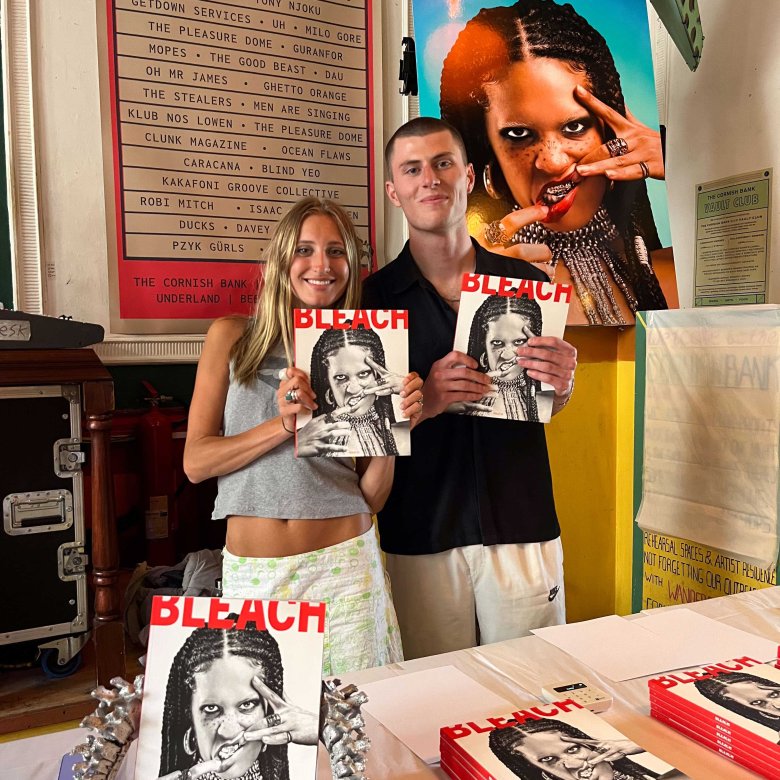
Monty and Alex at the Bleach Magazine launch at Cornish Bank in Falmouth.
With the first issue selling out in less than a month, the team behind BLEACH Magazine are clearly onto something. Co-founded by Falmouth Fine Art BA(Hons) graduate Monty Cooke and Photography BA(Hons) graduate Alex Wilson, the duo have big ambitions for their independent photographic, fashion and artistic publication, driven by a desire to help emerging creatives get their voices heard.
Featuring works from both emerging and established creators, the magazine has been published in print form (with their website launch coming soon), and features bold visual works coupled with essays and poetry, championing their core mission to create a platform for collaboration and engagement.
We chatted to Monty and Alex about the mag, their time at Falmouth and the importance of creative collaboration.
How did you first come to work together and where did the idea for BLEACH Magazine come from?
Monty: We’re actually a couple and met while studying at Falmouth. Alex was looking for a stylist for one of his shoots, and it was something I had always wanted to try out, so I did, and it went really well. So, I now do most of Alex's styling for his shoots. We really owe Alex’s tutor for sparking the idea of a magazine through a throwaway comment suggesting his images would really lend themselves to this physical format. Little did he know at the time he was planting the first BLEACH Magazine seed!
Alex: Something else we’d both been thinking about was how we might help other emerging photographers and artists, because it's so difficult to get your work out there. We’ve all experienced the disappointment of being turned down when making applications for projects. So, we started to envision building something that could give other young artists a platform, and a magazine seemed like a great opportunity.
Sourcing artists from all over the world was a real highlight. It was nice to communicate with different people and get to know others in the industry making their first steps at the same time as us.
What is it about magazines that you find inspiring and helpful to the emerging creatives?
Alex: As digital platforms have grown, the popularity of magazines did decrease for a while, but from conversations that I've had with publishers and producers, they’re coming back around and they're going to be the next big thing again. People want that ability to flick through an actual physical copy of something. In fact, the first issue of BLEACH is titled ‘The tangible, the tactile and the transformative’, inspired in part by this revival.
Monty: It's definitely more collaborative working on magazine production than other mediums, too. We've worked with so many people on this first issue, for example having the website built by a Paris-based graphic designer who approached us early on asking to be part of the project. There’s also the scope of future issues, which is exciting.
What has been the highlight of producing the first issue of BLEACH?
Monty: We both worked with lots of talented people during our time at Falmouth, and working with Graphic Design students Misty Scrimgeour and Blythe Walker Sibthorp was excellent; they did an amazing job of designing the magazine and making the whole thing flow so beautifully. Sourcing artists from all over the world was also a real highlight for me. It was nice to communicate with different people and get to know others in the industry making their first steps at the same time as us. We also featured work by some more established artists which was inspiring.
Alex: Compiling the list of contents was really cool; gathering all the different artist’s names from Australia, Hong Kong, France, Belgium – people from all over the world who we've worked with – felt like a real achievement. Also, when the first print copies arrived, getting to hold them physically in our hands was an awesome feeling!
What are your future ambitions for the magazine?
Monty: Funding is definitely something that we are going to try and knuckle down. We did make a profit from the first issue, because we had organised crowdfunding, and we had a limited print run of 100 issues. We sold out of those quickly, so are aiming to print 300 or more for the next issue. We’re also passionate about continuing to collaborate; the beautiful thing about how we work together is we relish sourcing artists to take part, and we’re both aware of lots of great designers and creatives in other areas we want to feature in future issues.
Alex: Another next step is to grow BLEACH into more of a commercially viable business without losing the overarching ethos with which we started the mag. We’re already getting emails from people wanting to shoot for us, write for us and make work for us, and so we need to make it commercially viable and to achieve the financial stability to be able to experiment more with the physical and visual product, and to develop new themes for future issues.
From what I've already learned from being on set with other people, and from what I've read, you need collaboration to succeed.
What would you both say has been the highlight of your time being creative students at Falmouth?
Monty: Having a studio space was a highlight for me; it is just really nice to be with other people in a shared space, to talk about your work and share ideas. Also working with Alex - if he hadn’t been looking for a stylist, I wouldn't have found my passion for styling. We have developed our own paths but have also pushed each other to reach our creative potentials.
Alex: I’d agree; the photography studios are just amazing, as was the contact time I got with tutors. Whenever I was in the studios I could just go and find a tutor or technician, and they would come and help me to develop my ideas.
Why is creative collaboration important to both of your practices?
Monty: I originally studied interior design, but realised I wanted to explore a broader set of creative avenues, so I switched to studying fine art. I don't think I would have done that if it wasn't for coming to Falmouth and collaborating with other people; although I've always loved painting, it wasn’t until I met fine art students in the studios during my first year that I realised it was something I’d like to explore.
Alex: I may only be a 22-year-old trying to find his way in the creative world, but from what I've already learned from being on set with other people, and from what I've read, you need collaboration to succeed. It’s a central part of the creative world and it's important to start doing it as early as possible, because the more you collaborate, the more people you meet and bigger your networks become.





